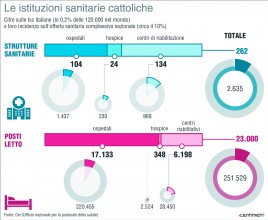Pastoral care
On February 11 1993 the first World Day of the Sick was held in Lourdes, established the previous year by John Paul II. On February 11 2017 the 25th Day, will be celebrated in a special way in the town on the foothills of the Pyrenees, with the theme “Amazement at what God has accomplished: “The Almighty has done great things for me …” Father Carmine Arice, Director of CEI’s National Office for Health Pastoral Care, drew a balance of the past 25 years with a view to the future

On February 11 1993 was celebrated the first World Day of the Sick, established the previous year by John Paul II. On February 11 2017 the 25th Day will be celebrated in a special way in the town on the foothills of the Pyrenees, with the theme: Amazement at what God has accomplished: “The Almighty has done great things for me …” This year’s anniversary coincides with the 20th anniversary of the establishment of the Italian Bishops’ Conference’s – CEI – National Office for Health Pastoral Care. On the occasion of the twofold recurrence, on February 10 Pope Francis granted a special audience to the Episcopal Committee for Service to Charity and Health, to the National Office and its Commission, to the Director of related diocesan departments. Fr Carmine Arice, member of the Society of Cottolengo Priests, is the director of CEI’s National Office and member of the Pontifical Commission for the activities in the healthcare sector of public legal persons of the Church. SIR asked him to draw a balance of the past 25 years of the Day with a view to future prospects.
Fr Arice, have the objectives set by John Paul II in 1992 been achieved? A lot has been done with regard to progress and research, to medicine and support to the sick. However, the past decade registered a decline in the assurance of treatment to weaker population brackets, and million of Italians have renounced it. We have witnessed the establishment of a vicious cycle, namely – poverty – healthcare poverty – increased illnesses. The risk is that the cuts on healthcare spending could be higher than the costs that would ensure poor people’s access to healthcare covered by the State.
And from the pastoral perspective? In the past 25 years almost all dioceses have set up a Pastoral Healthcare Department. While in the past such commitment was entrusted to the chaplain or to the priest, today it involves lay Catholics, Deacons, Extraordinary Ministers of Communion. The entire Christian community is the primary object of pastoral care, which concerns, in a synergic approach, also other forms of pastoral care devoted to the integral care of the human person.
Hence an inclusive pastoral care, integrated at territorial level? Yes. Without forgetting the hospitals. Local realities are those requiring further development. Most sick and disabled persons live at home.
Religious families and parishes play a strategic role. The latter’s resources ought to be enhanced further through networking activity.
Cuts to healthcare services have led 11 million Italians to renounce treatment, to changes in the medicine “statute”… Given these circumstances, what could be the role of the Church? We need new, significant undertakings that will respond to the true, unfulfilled needs of weaker population brackets, comparable to those of great founders such as Saint John of God, Saint Camillus de’ Lellis, Saint Joseph Cottolengo.
We are facing a twofold challenge: to serve as prophecy and critical conscience before the responsibilities of civil society, while offering signs of hope through concrete works of mercy.
In addition to soup kitchens many Dioceses have increased the number of Outpatient Clinics, while several Old Age Homes run by the religious have set up Emergency Care units for the poor. But it should be remembered that we are not NGOs, as the Pope has pointed out on several occasions. At n. 200 of Evangelii gaudium, Francis cautions that “the worst discrimination which the poor suffer is the lack of spiritual care.” We are called to care for their need of God.
Perhaps the Church should also be capable of forestalling future scenarios… The Church has always had a word of wisdom about health and fragility. We should continue having these antennas. It is mostly the elderly who will require assistance in the coming years. This reminds me when, in very difficult times, Paul VI began to describe this situation as emerging poverty. Bioethical questions and end-of-life are also “hot” issues.
In this regard, in his Message for the Day of the Sick 2017 the Pope highlights the importance of spreading a culture that is respectful of life, along with the defence of the integrity and dignity of persons. Also the Bishops, in their recent permanent Council have voiced their concern over the Legislative Decree on the theme of end-of-life due to be discussed in parliament… We can’t support the text of the bill as it is now. Our disagreement is not on confessional grounds but rather in name of a sound vision of life that cannot endorse a principle of self-determination reducing it to an automatic executor of intentions without the possibility of “accompanying” such decision.
 There are 120 thousand Catholic healthcare institutions worldwide, 262 in Italy. What is their ‘raison d’être’ today? What are their main features? They are part and parcel of the identity of the Church and they form part of the national fabric via various operational roles, but they will have to manage to make constant adjustments.
There are 120 thousand Catholic healthcare institutions worldwide, 262 in Italy. What is their ‘raison d’être’ today? What are their main features? They are part and parcel of the identity of the Church and they form part of the national fabric via various operational roles, but they will have to manage to make constant adjustments.
They should be marked by five distinguishing traits: operating excellence, integral care of the sick person, preferential option for the poor, respect and promotion of ethical values, care and pastoral accompaniment for the sick.